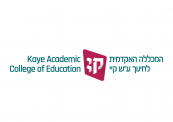
Kaye College is located in Beersheba, in the southern periphery of Israel, and serves a yearly number of 4,000 students in B.Ed, M.Ed, M.Teach programs and teachers in various courses for professional development.
The served population is socio-economically and ethnically diverse, including religious and secular Jews, Ethiopian and former Soviet Union immigrants, Bedouin (about 48% of all students), and Arab students.
It features a Center for Motivation and Self-Determination, as well as a Multiculturalism Center. In 1996 and 2007, the college received awards from UNESCO for its contribution to Jewish-Arab coexistence. The college educates democratic values, coexistence in a multicultural society, and communal, social, and civil activism and leadership. Its pedagogy is focused on the active learner, who is self-determined and autonomously motivated. It has developed innovative programs in cooperation with the Ministry of Education, such as “Shachaf,” which focuses on the development of second-career teachers’ professional identity through educational dialogue that constructs meaning within the context of multiculturalism.
The college has unique knowledge and experience in promoting growth processes among teachers from different sectors in Israel's social periphery. The widening gaps between the Israeli center and periphery are increasing the need for training and retention of quality teachers, in order to provide students in the southern region with a chance to succeed. Each year, the college's unit for Internships and Entry into the Field of Instruction offers fifty courses that guide new teachers through their internship and first year of work, alongside courses for mentors of the emerging teachers. This year, for the first time, the program is operating “educational incubators” within two secondary schools, one Jewish and the other Bedouin.
In addition to its work on other international and Israeli inter-institutional projects, Kaye College is currently involved in 2 international collaborative projects funded by the European Union: TEMPUS IRIS, which focuses on the internalization of higher education and on fostering academic international relations in Israeli academic colleges, and TEMPUS DOIT, aimed at building a curriculum for academic institutions on multiculturalism.



